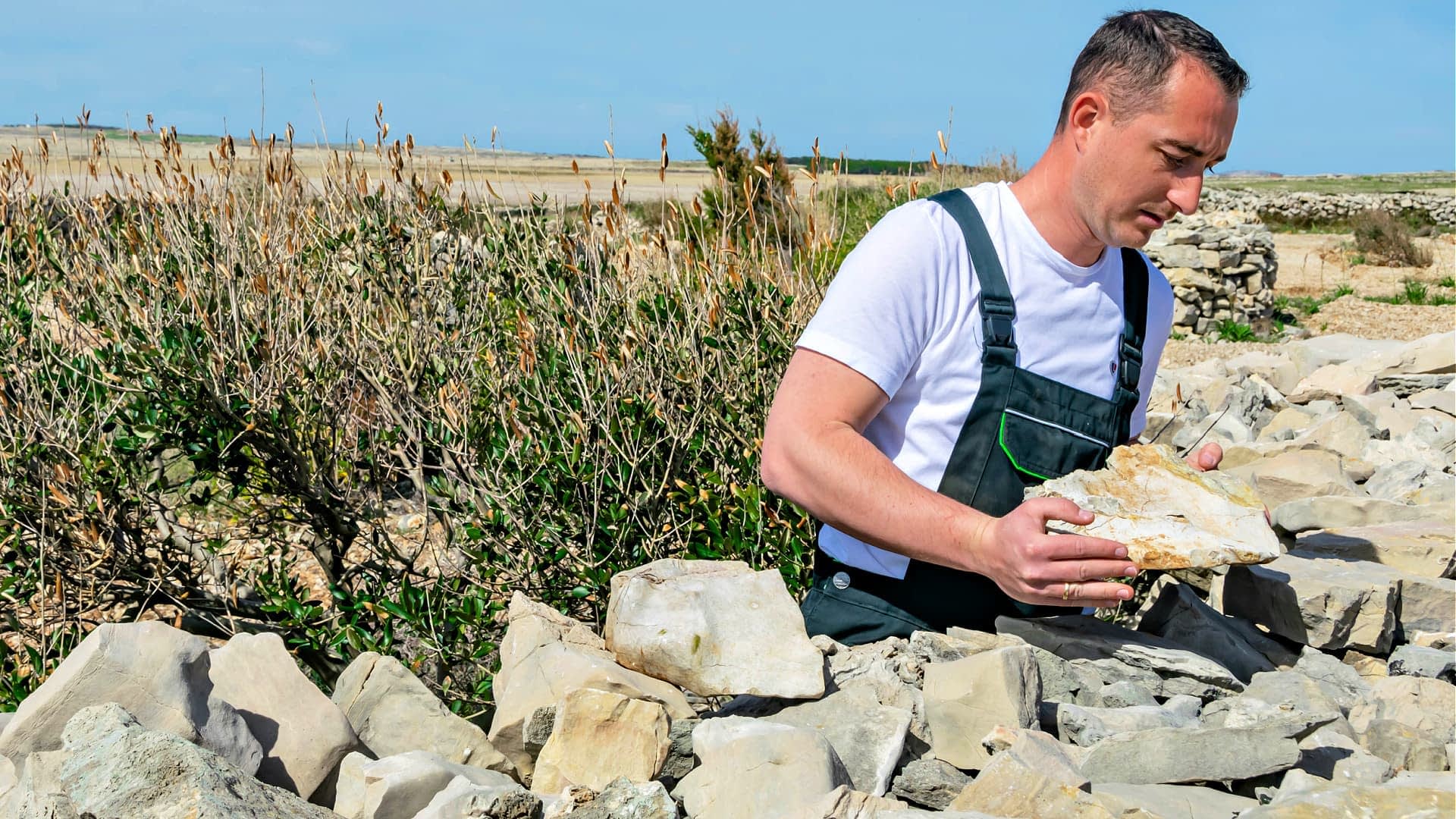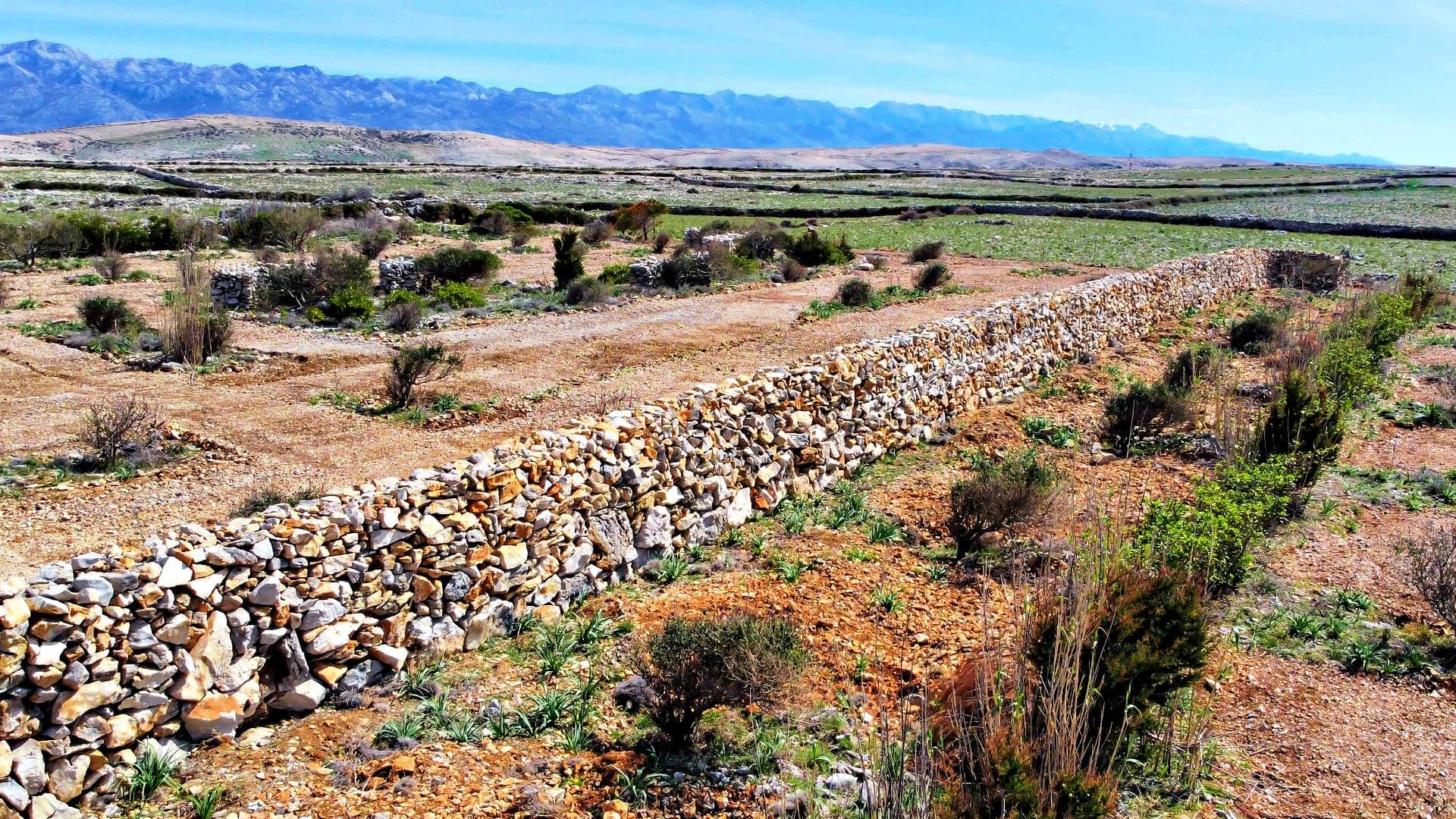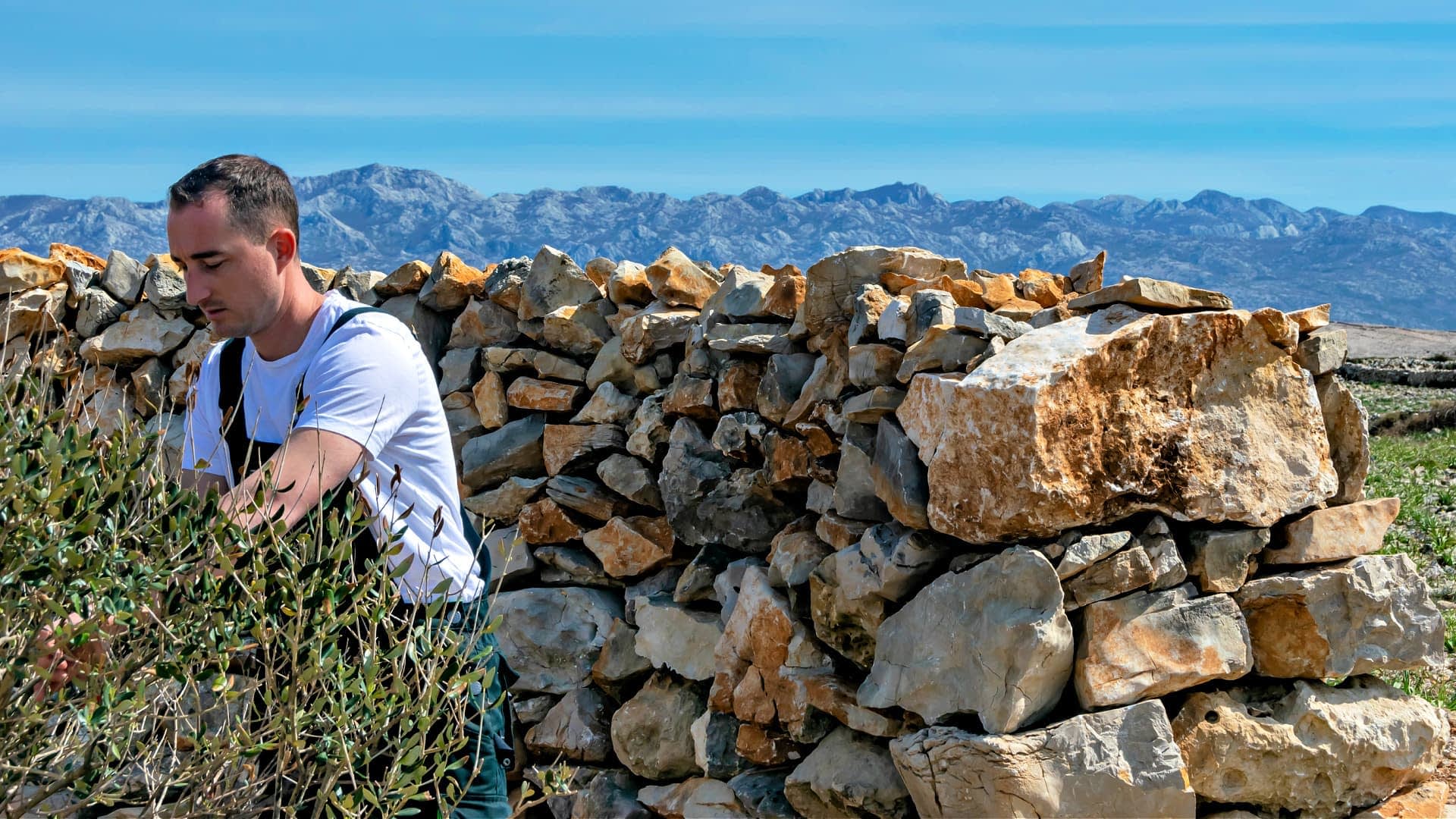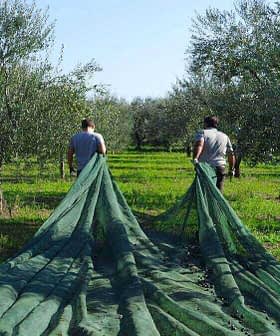Protecting Olive Trees on the Island of Pag With Dry Stone Walls
One olive farmer on the Croatian coastal island is revitalizing olive trees by building an environment to protect and nurture them.
 Filip and his father, Branko, with a new dry stone wall that protects olives
Filip and his father, Branko, with a new dry stone wall that protects olives The Croatian island of Pag is famous for its sheep, cheese, Lun olive groves and dry stone walls.
There are more than 1,000 kilometers of them, and today they represent an architectural heritage under the protection of UNESCO.
There are kilometers of old dry stone walls around our olive grove, so it’s hard not to remember my great-grandparents who built them. Therefore, this is our monument to them and those who come.
The walls were built a long time ago, from dry stone – without any mortar to bind them together – as a sign of the boundaries between pastures, and there is a new one. It was built by a 30-year-old master of agronomy Filip Mandičić from Vlašići, on the southern tip of Pag.

Filip Mandičić: Olive gives the highest quality in the most difficult conditions
“I built the dry stone wall to protect the olives from the impact of the bora [a cold, dry wind that blows from the north] and salt,” he told the Olive Oil Times.
See Also:Olive Farmers on Croatian Island Sue Local City Over Land OwnershipThe dry stone wall is one meter wide and almost two meters high, 180 centimeters. It is by far the largest not only on Pag but also in other Mediterranean countries where this construction method is used.
What is the fight with the bora, what is the love for olives, are the most common comments of locals and passers-by who express their admiration for this unusual venture.
“If there is no love, who would do it, Mandičić said. His passion for olives began when he was young due to his father, Branko, 73, who planted about 150 Oblica, Leccino and Pendolino olive trees on 0.7 hectares about 15 years ago.
It turned out that the location of Veliko Blato in front of the settlement Vlašić is not very favorable for olive groves, with severe storms hitting the island and wind speeds occasionally exceeding 180 kilometers per hour.
“Certainly more,” said Branko. “I remember when we couldn’t walk but crawled to get to the sheep and feed them.”

Monument to grandfathers: Who would do this if not for the love of olives and heritage?
With the bora, salt is blown down from the Velebit mountain. The phenomenon occurs when the wind from the turbulent sea in the Velebit Channel lifts drops of seawater and creates “sea smoke.”
After the water evaporates from these droplets, a thin layer of salt remains that settles on the soil, grass, shrubs and trees. Salt is especially harmful to young olive trees. As a result, they remain small and without leaves. Some do not even survive.
“I was 15 years old when I helped my father build dry stone walls around olive trees,” Mandičić said. “We made them in the shape of a crescent on the north side like a windshield.”
Also, at the top and middle of the olive groves, they dug a canal a meter deep and wide in the width of the olive grove.
“We brought soil to those canals and planted reeds, pittosporum and cypress, all for a green fence to protect the olives from the bora,” Mandičić said.

He noted that the bora does not bother the olives. Instead, the trees are bothered by the salt brought by the bora from the Velebit Channel. If it does not rain quickly after the bora to wash away the salt, defoliation occurs.
The olive trees lose their leaves and have to spend their energy in the following year exclusively on renewing the leaf mass, so there is no yield or a minimal one.
Over the years, Mandičić observed that the protected olive trees grew more quickly but only to the height of the dry stone wall. Everything higher than the walls was affected by the bora.
However, the olives were left to themselves for a while. Mandičić said his father became ill and could not care for the trees while he was in high school in neighboring Zadar and had limited time to care for the trees.
After high school, Mandičić enrolled in the karst agricultural program at the Marko Marulić Polytechnic in Knin, roughly two hours southeast of Vlašići, where he first learned about organic agriculture and olive growing.
“Already, after a few hours of organic farming, I knew that I would continue my education in that direction,” he said.
Today, Mandičić knows he made the right decision. He said that he is extremely grateful that he had the privilege of listening to lectures by Frane Strikić, one of the leading experts in olive growing, which had a significant influence on him.
After Knin, Mandičić decided to continue his education by enrolling in a graduate studies program in organic agriculture in Osijek, in the very northeast of the country.
After completing his studies, he was employed as a technical associate in the then Croatian Agricultural Agency, now the Croatian Agency for Agriculture and Food, where he stayed for less than four years.
In addition to work, he spends every free moment on the family estate, planning how to revitalize and protect olive trees.
At first, the olive grove was in desperate need of repair and management, so Mandičić applied for a €15,000 grant.
He used the funds to build a 60-meter long, meter wide, 180-centimeter high dry stone wall in the middle of the olive grove to serve as a windbreak, clear the field and harvest and mill the olives. The stones from the wall came from the surrounding landscape.
“Look, there are kilometers of old dry stone walls around our olive grove, so it’s hard not to remember my great-grandparents who built them,” Mandičić said. “Therefore, this is our monument to them and those who come.”
What has been proven in practice and what he has had the opportunity to see is that olives give the highest quality in the most challenging conditions.
Last year, especially climatologically, did not favor local olive growers, but the yield was solid due to the dry stone wall and protection from the bora and salt.
“We did the harvest according to the profession’s rules,” Mandičić said. “The harvest was on October 15. The fruit was processed in Ljupče, in the Dušević oil mill, within 12 hours of the harvest to preserve the quality.”
The oil went directly into the stainless steel tanks and, after a month, was poured into dark glass bottles.
“The obtained oil has a pronounced fruitiness, medium bitterness and spiciness,” Mandičić said.
In addition to olives, he also started sheep farming. Last year, he procured 10 sheep, which this year birthed 15 lambs. Mandičić plans to raise sheep only for lamb meat. Milking as a primary job takes a lot of time.

10 sheep 15 lambs: Breeding pag pramenka pays off.
There is also a well in the olive grove from which they draw water, which is needed for the olive trees and the sheep, which also graze grass and fertilize the olive groves.
Mandičić added that genetic research has confirmed that the Pag pramenka is the most profitable sheep in the world.
Next year, the Mandičić family plans to plant a new 60 olive trees in two locations. “There used to be vineyards in those locations, and today they are kept as arable land,” he said.
As the family farm is also engaged in the production of mixed vegetables, which they planted when they began renewing the olive groves with the grant, the family has also acquired an irrigation system for arable land, which they expect to increase the yield by up to three times.
As the adage goes, success breeds success and Mandičić hopes to keep his own, and his family’s going through his production of organic olive oil, Pag pramenka and seasonal mixed vegetables.








